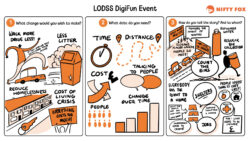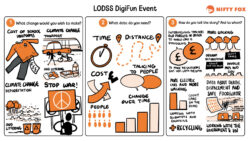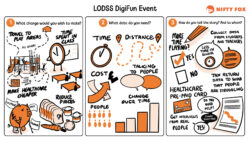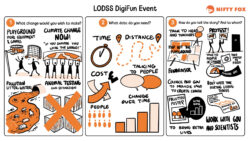Open Data Science for Schools 2024 Write-up
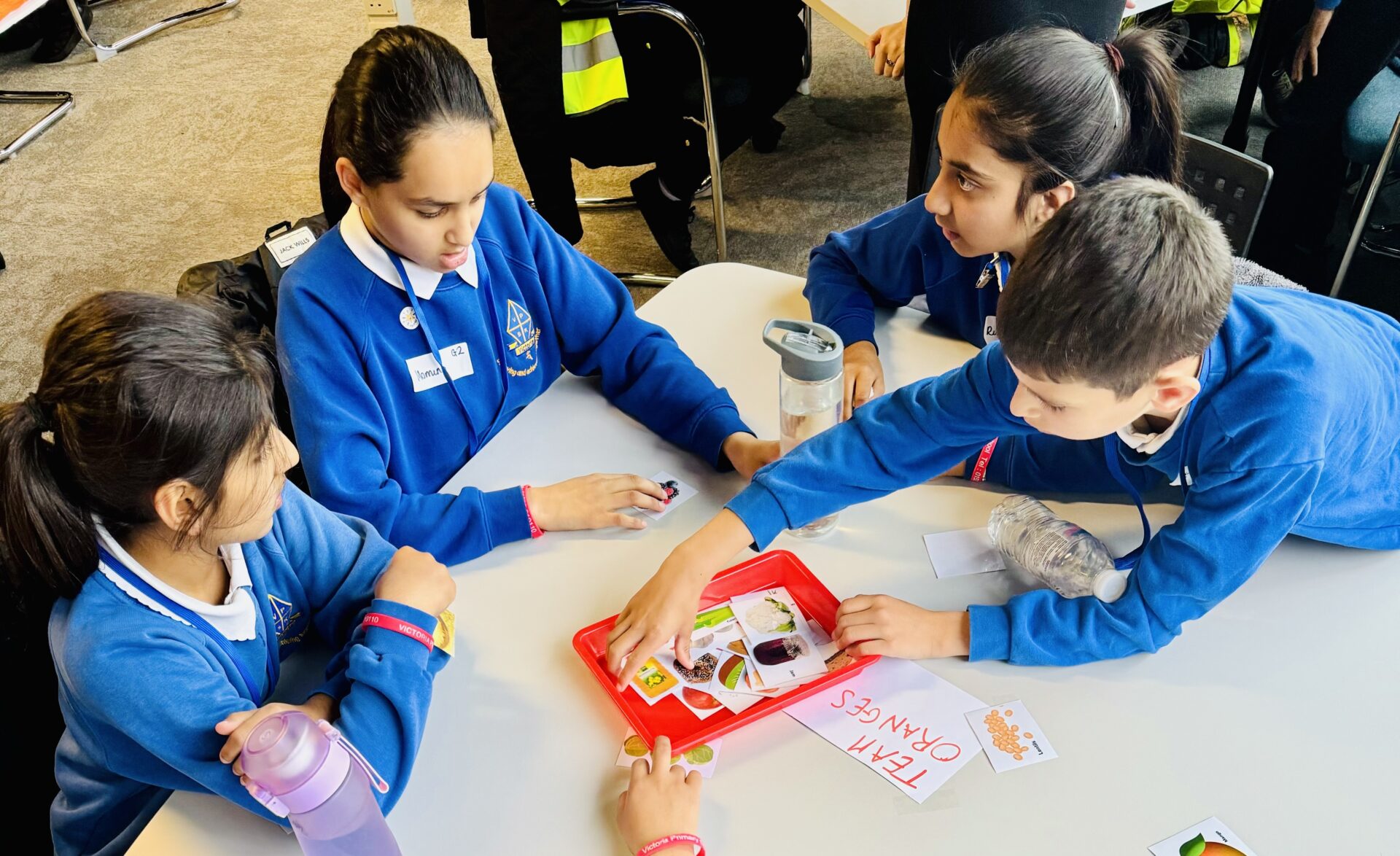
The Aim
The LIDA Open Data Science for Schools Initiative works with schools in Keighley (Bradford district) to deliver a set of engaging activities that develop students' digital skills while also tackling some of the town's pressing challenges, such as low aspiration, poor food security, and a lack of awareness around healthy eating.
This year, the project had two stages on two different days: the 2nd and 9th of July. The first stage of the initiative, named DigiFun, was composed of four activities designed for primary school students in years 5 and 6, each with a unique purpose. On the one hand, the activities jump-started students' imagination about how we can create and leverage data to make a positive difference in the world. At the same time, the activities gave students an immersive cooking experience in Virtual Reality (VR) whilst also fostering their creativity in building a fun reaction times game using the "Scratch" programming tool. Lastly, one of the activities raised students' awareness around the Eat Well Guide and healthy eating through a collaborative activity and a competitive digital riddle-based quiz.
The second stage, named Fun Moves, was an interactive event designed to share the benefits of active lifestyles on physical and mental well-being in addition to promoting activities that refine fine motor skills. The evening comprised of talks, presentations, interactive stands and a dance performance by the fabulous Dance United Yorkshire.
The following provides a detailed description of each activity's development process and execution. Furthermore, we highlight the impact we hope to have made on the students and the value of our LODSS project partners.
LODSS Stage 1: DigiFun (4 Activities)
Activity 0: Student-led Aspirations (led by Abdelrahman Ibrahim)
The activity was built around students’ life experiences and stories about change they aspire to make in their worlds. The overarching objective of the activity was for students to embrace their narratives and learn how to use data to support them. Actionable objectives were as follows:
- Introduce students to the non-technological side of data science: Real world challenges to solve or desired impact to achieve.
- Enable students to reflect on societal and environmental challenge and how to turn it into a data science problem
- Introduce students to the importance of multidisciplinary teams: It is about data and code, but most importantly about the story.
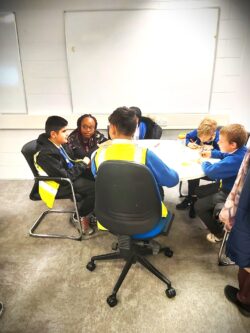 With the immense help of Favour, Folasayo and the rest of the volunteers, students worked in groups of four to six to create a similar context to group activities in their everyday classes. They were encouraged to participate equally in identifying the ideas they cared about, select the most popular idea and elect a representative to present to the audience. The ideas covered a wide breadth of topics; from creating more spaces for children to play to ending war, and from reducing the prices of self-care products to alleviating child poverty in the time of climate crisis.
With the immense help of Favour, Folasayo and the rest of the volunteers, students worked in groups of four to six to create a similar context to group activities in their everyday classes. They were encouraged to participate equally in identifying the ideas they cared about, select the most popular idea and elect a representative to present to the audience. The ideas covered a wide breadth of topics; from creating more spaces for children to play to ending war, and from reducing the prices of self-care products to alleviating child poverty in the time of climate crisis.
The students went on to think about how data can help achieve the desired change by thinking about specific and measurable indicators. For example, one group suggested calculating the area of playground per child, and another group suggested estimating the number of children who don’t get enough healthy food in different parts of Keighley. Finally, each group designed possible data-driven interventions to achieve the change such as opening new playgrounds and food banks in areas that has less access to playgrounds and healthy food options. In the background, Liam - a live scribe from Nifty Fox - was using his artistic magic to produce a visualised summary of each session.
I personally found the experience very enriching as it provided a realistic validation of the importance of such brainstorming activities. While data and methods are integral to data science, the ability to envision better futures is a prerequisite for data science for public good. Students exceeded any expectations we had, as a facilitation team, for children at this age. They showed great collective abilities to communicate ideas, think quantitatively and imagine potential solutions. A lesson learnt though is the importance of introducing some movement activities in the future, as they help keep students focused and energised.
Liam from Nifty Fox shared the artwork with us (see end of article) to send to the students as a memento for their collective innovation and to carry the memory with them in their future quests for change. The activity received some interest from the Educational Engagement team at the school of environment, who asked us to share the planning materials with them to include in their outreach activities with slightly older age groups. This was an excellent conclusion to the activity as it showed the potential for lasting impact.
Activity 1: Healthy Eating (led by Ahmad Ammash)
As the activity theme was Healthy Eating, its aim was to encourage the children to consume more healthy foods (e.g. fruit and vegetables) and much less unhealthy snacks (chocolate, biscuits, crisps, and candy). At the same time, the activity's purpose was to raise awareness about healthier alternatives to conventional foods – particularly those some children may not know of. For example, one of the objectives was to promote the conception of low-fat and plant-based protein sources such as lentils, chickpeas, and beans (in contrast to high-fat sources such as processed meat).
 Accordingly, we decided to centre the pair of activities around the Eat Well Guide, as it would give the students a clear idea of what they should eat most and what they should try avoiding as much as possible. Besides, the Eat Well Guide achieves that objective in a highly intuitive and visually appealing manner.
Accordingly, we decided to centre the pair of activities around the Eat Well Guide, as it would give the students a clear idea of what they should eat most and what they should try avoiding as much as possible. Besides, the Eat Well Guide achieves that objective in a highly intuitive and visually appealing manner.
Before starting the activities, we decided to give the students a brief lesson about the Eat Well Guide to ensure that all students were at the same level of knowledge. This lesson accounted for any potential differences in competency levels between the students.
Moreover, we decided to do both activities in groups of 5-6 students to further minimise the adverse effects of any differences in competency levels between the students, so nobody is left to think on their own.
The first activity used a large Eat Well Guide pie chart painted on paper. It asked students to sort laminated photos of foods into their respective categories (carbohydrates – fruit and vegetable – protein – oils & spreads – dairy – snacks falling outside the Eat Well Guide). This activity allowed learners to reinforce the existing knowledge they gained through our brief lesson on the Eat Well Guide. At the same time, it allowed the learners to make decisions as a team and learn from each other.
The second activity was an online multiple-choice riddles-based quiz created using Slido. The quiz, composed of 15 questions and required the students to guess the food product based on the description and images provided. A tablet, which was logged into the quiz, was given to each team. Slido awards the responding teams with points based on the correctness of their answers and the speed at which they provided these answers. As the activity is of a competitive nature, the students enjoyed it and took the opportunity to think together before deciding on an answer to each question.
Both activities reinforced the children's knowledge of the Eat Well Guide and raised awareness around healthy food alternatives that they can use to maximise the health benefits of different foods while minimising the amounts of fat and sugar consumed.
The development process for my LODSS activity was a lot of fun. Partly, the preparation involved using papers, scissors, glue, and paint to create the Eat Well Guide needed for the first part of the activity. The latter felt like "back to basics", as it reminded me of the art sessions and workshops we used to have at school well over a decade ago.
Besides, the ideation phases for the whole activity confirmed the importance of making the most of the experience, knowledge, and ideas of colleagues in my activity team. Team members include Emily Connell (a data scientist colleague), Melanie Reed (Education Director at Rethink Food), and Charlotte Sturley (an academic professional at the University of Leeds). Combining their ideas and feedback throughout the development phase led to designing a pair of engaging, competitive, teamwork-focused activities that are accessible to all children regardless of their competency levels.
 Whilst some children had good knowledge of the Eat Well Guide, many had not seen it or had an insufficient understanding. Accordingly, the activity reinforced everyone's knowledge of the guide, the five food categories it uses, and the quantities of different foods they should aim to consume every day. One of the most common gaps that we realised was that many students were unaware that lentils, chickpeas, and beans are some excellent plant-based protein sources. Using explanation, many students only linked proteins with meat and fish. Hence, the activity taught these learners that there are alternatives to meat that offer the same benefits. Another piece of information which was always up for debate amongst students was that butter falls in the oils & spreads category rather than the dairy one – even though it contains milk.
Whilst some children had good knowledge of the Eat Well Guide, many had not seen it or had an insufficient understanding. Accordingly, the activity reinforced everyone's knowledge of the guide, the five food categories it uses, and the quantities of different foods they should aim to consume every day. One of the most common gaps that we realised was that many students were unaware that lentils, chickpeas, and beans are some excellent plant-based protein sources. Using explanation, many students only linked proteins with meat and fish. Hence, the activity taught these learners that there are alternatives to meat that offer the same benefits. Another piece of information which was always up for debate amongst students was that butter falls in the oils & spreads category rather than the dairy one – even though it contains milk.
My activity partners and volunteers were invaluable assets throughout the development phase and on the activity day.
Melanie's expertise in education, Charlotte's creativity, and Emily's ideas greatly contributed to designing a pair of activities that were engaging, accessible, entertaining, collaborative, and fit into a 30-minute time slot.
Also, on activity day, the presence of my partners and team of volunteers was critical to ensuring a smooth transition between the two parts of the activity while always supporting the children and responding to their queries. Besides, Melanie's classroom experience and ability to communicate with children while keeping them engaged was key to maximising the value they got from the Eat Well Guide lesson at the start.
Activity 2: Digital Skills (led by Aditi Sudhakar and Vineeth Vellala)
Activity 2 of the LODSS DigiFun event was an interactive workshop using Scratch programming, a simple graphical interface, to create an exciting reaction time game. The session gently introduced students to basic coding concepts and logical thinking, all playfully and engagingly, while also sparking their interest in potential careers in data. The workshop took place in the Makerspace lab of HELIX. Aditi Sudhakar, a Data Scientist from LIDA, and Vineeth Vellala, an MSc Data Science and Analytics student, led it.

To our delight, the experience was overwhelmingly positive, well received by the children and exceeded our expectations. Initially, we were concerned that engaging the children might be challenging or that the coding task would be too complex for them. However, we were pleasantly surprised that many children were already familiar with Scratch and quickly grasped the concepts.
Teachers had thoughtfully paired the children based on cognitive ability. Each pair was assigned one laptop and provided with paper code blocks to rearrange and spell out their ideas. We anticipated some boredom or disinterest, perhaps even the typical unruliness one might expect from ten-year-olds. Instead, the children responded enthusiastically, remained engaged, and behaved wonderfully. They were introduced to essential concepts such as algorithms and debugging and got a taste of how data can be applied by developing a small game to test their reaction times. This friendly competition led to some endearing and cheeky responses about their future aspirations.
One of the most touching moments for me, on a personal level, was when a young girl sighed in resignation upon hearing that it would be a coding activity. "Oh no, I hate coding," she lamented. Overhearing her, I asked her why she felt that way. She replied that it was too difficult and she couldn't understand it. At that moment, I was transported back to my own experiences. I shared my story with her, recalling how I was once a little girl who cried over pages of code, unable to fathom how I was supposed to make sense of anything. I explained that breaking complex problems into smaller, manageable parts was key to understanding. I made it my mission to ensure she felt capable and encouraged her to try. By the end of the activity, I asked if she still found coding too difficult. To my absolute joy, she responded that she now believed she could code. Hearing that was the highlight of my day and is an anecdote I will share for a while.
This activity would not have been possible without the expertise and dedication of Jody Carter from Code Club, Raspberry Pi Foundation. His engaging delivery, thoughtful activity design, and ability to captivate the children was brilliant. Jody's passion for coding and education shone through every moment of the activity, making complex concepts accessible and fun for the young participants, and we were incredibly fortunate to have had his guidance. I'm also immensely grateful for the support of our event volunteers, master's students Lynette Linzbuoy, Emily Veal, and Leah Thorpe. Their enthusiasm, patience, input and dedication were invaluable to the workshop's success.
The collaboration, spirit of teamwork, and quick response to unanticipated events displayed by everyone involved were heartwarming and instrumental in making the activity a memorable experience for the children. It's a testament to the power of community and the incredible things we can achieve when we come together with shared passion and purpose.
Activity 3: VR Experience (led by Liam Bailey and Preeti Sharma)
Preeti Sharma
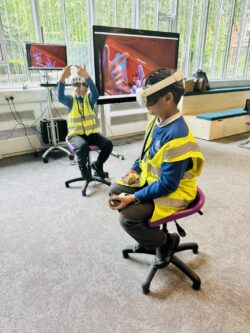 This was an interactive session, offering students the opportunity to experience virtual reality (VR) using Meta Quest VR headsets and VR treadmill technology. It was run in collaboration with HELIX, a hub for technological innovation at the University of Leeds.
This was an interactive session, offering students the opportunity to experience virtual reality (VR) using Meta Quest VR headsets and VR treadmill technology. It was run in collaboration with HELIX, a hub for technological innovation at the University of Leeds.
This workshop aimed to deliver a memorable experience, exposing students to virtual reality technology while reinforcing the importance of healthy eating and an active lifestyle. Each student had the opportunity to play a cooking game using the Meta Quest headsets, whereby we promoted cooking as a skill for life and demonstrated the fun that can be had while preparing your food.
We were fortunate to have expert support with the VR facilities at HELIX and are grateful to Joshua Gregg and the rest of the HELIX team for the smooth running of the workshop on the day. This session wouldn't have been possible without the event volunteers, so we'd like to thank Marlous Hall and Toluwani Osabiya for their time and support in executing our vision.
Liam Bailey
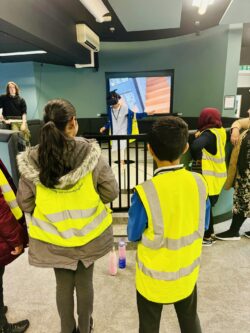
During this activity, the children seemed very engaged and enjoyed using the VR headsets and the Omni Deck—the only kind in the UK!
I enjoyed the experience, learning to engage with the children from this age group and adjusting learning approaches to account for the children's different personalities and meet the project's learning objectives. I learned to be adaptable and flexible and how to overcome unexpected situations (e.g. the children were divided into more groups than expected, and I was not aware that it was a competitive game).
The children had mixed responses to the activities. Some adjusted quickly to VR gaming, while others required more support. The same can be said for the written task—some dived into it, were engaged, and became curious, while others required more prompting.
Students learned about the different skills used during cooking, such as motor skills and broader skills such as teamwork, discussed during the written activity. They were also asked to think about how to make a meal more balanced, and through discussions and suggestions, they were introduced to food that they had not tried before, such as avocados.
The children also learned how VR is used in the real world. One child was particularly interested in working with VR in the future. I was surprised when asked about my occupation. When I told them I was a data scientist, a group was excited about the word 'scientist'.
The Leeds University student ambassadors were amazing at helping during the activity by helping with organisation and checking in to ask if any support was required.
LODSS Stage 2: Fun Moves
Active Travel Hero (Led by Lydia Wharton)
"Active Travel Hero" is an interactive video game designed specifically for the event to educate children about the benefits of active travel. In this 8-bit game, players jump on a sensor pad to move characters across the screen. In one level, they help a person in a wheelchair navigate Bradford; in another, they assist a woman cycling. The game features text screens with key facts about active travel, promoting its benefits for mood, health, and the environment through engaging, physical gameplay.
What originally started as a presentation developed into an interactive game based on feedback from friends and family with primary-school-aged children. I asked about current playground fads and TV programs, and a common theme emerged: they all enjoyed video games. This vividly reminded me of playing video games with my brother, and how after so many years I still remember the joy and celebrations when I beat his score! If I could combine a positive memorable experience with the dissemination about the benefits of active travel, then perhaps it would not only associate active travel with having fun but create a lasting impact.
I feel this activity had a very positive impact on the children. They were excited to play the game and learn about active travel, and I hope it has a lasting impact on creating positive connections with active travel. My experience planning and showcasing the game followed the event namesake: fun! I was pleased that the children engaged with the game I had designed for them and took part in the friendly competition to beat each other's scores. It was great to teach kids about active travel in a fun way that included being active themselves. Additionally, from a development perspective, it has not only enhanced my soft skills in teamwork and collaboration but also allowed me to gain hard skills in electronics, such as working with circuits and soldering.
It was fantastic to work with the project team and partners, from the ideation meeting to the event itself. It was heartwarming to see everyone come together, united by the common goal of improving the quality of life in our community through encouraging active lifestyles. Special thanks to all our partners: Act Locally: Keighley, Keighley Community Together, Centre for Applied Education Research, Living Well Keighley, Active Travel Bradford & WYCA Travel team, Dance United Yorkshire, Leeds Beckett Occupational Therapists , and the University of Bradford.
Partner quotes
Jackie Renton, Head of Victoria Primary School said, "This is a great event for our pupils. It informs and encourages their aspirations and opens their eyes to opportunities for learning (that are not purely linked to books and 'study'). Pupils were enthused about the VR and many were going home asking parents to purchase one! They enjoyed the scratch coding and keen to do more of it in school.
The pupils said, "The VR was a first time experience that was really fun!"... "There was loads of brilliant stuff to try and it was exciting going into a real university."
